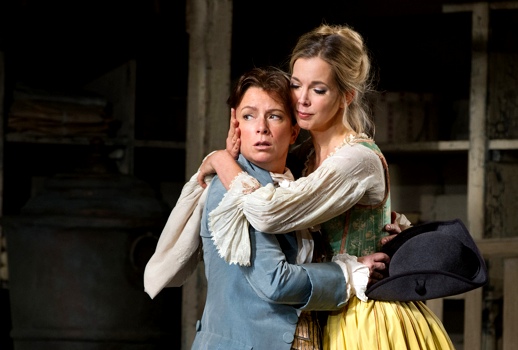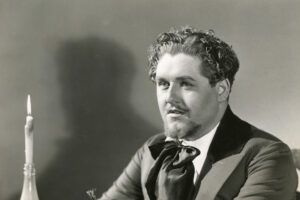

Jonathan Miller‘s production was originally a Big Event — there’s a video that preserves the starry first cast that included Renee Fleming, Bryn Terfel, and Cecilia Bartoli. But that was 1998, and this is 2012, and “Dr. Miller” is now persona non grata at the Met. As a result, much of his direction has been lost, and all that remains are the dollhouse sets and frilly costumes. Sometimes this is not a bad thing — different singers can and should bring their own interpretations to the roles. But what happened last night looked like a disastrous combo of embarrassingly bad direction, absolutely cringeworthy “personal interpretations,” and a heavy dose of vocal miscasting. And let’s face it, some just plain old bad singing. It was really one of those nights.
In the top tier of badness were the lead women — Mojca Erdmann (Susanna) and Maija Kovalevska(Contessa). Erdmann certainly looks the part of the spunky maid. She’s cute, blond, and petite, and has a heart-shaped face and button nose. Her voice however sounds like almost a caricature of the old-school Viennese soubrettes — scratchy and fluttery, without any color or warmth, and that tendency to peck at every note. She eventually became flat-out irritating to listen to, especially in her big aria “Deh vieni non tardar.”
She also seemed to think that Susanna is really Zerlina. This Susanna was a flighty, flirty young thing, and certainly not the moral center of the opera. In the first act she ended up straddling and kissing Cherubino. She had a habit of moving downstage, simpering, and singing directly to the audience when the libretto calls for her to be singing to another character. It was kind of comical to see her simpering downstage at the audience when “Susanna” is supposed to be frantically shuttling Cherubino out of the Contessa’s bedroom. She made Susanna a narcissist and she didn’t seem very in love with Figaro or devoted to the Countess.
Kovalevska has one of those large, metallic Slavic voices that sounds inherently wrong in Mozart. This might have been perfectly okay if she had any idea how to sing the music or act the Countess. Alas, no she did not. The Contessa’s two elegiac arias “Porgi amor” and “Dove sono” were sung in this weirdly aggressive, barky style. Forget appogiaturas — this Countess didn’t seem to know how to sing legato. This was not helped by Kovalevska’s unfortunate singing tic of making bug eyes and baring her teeth in a deranged-looking smile when she sings.
Her conception of the Countess was not a dispirited, long-suffering wife, but rather a sexually aggressive showgirl. In the second act she ends up rolling in bed with the Count while Susanna is right in the room. During “Dove sono” she shimmied her breasts at the audience and lifted her skirts to flaunt her shapely legs. And then, in the evening’s most bizarre moment, during the duet “Sull’aria” Kovalevska and Erdmann looked like they were on an episode of “Girls Gone Wild.” They were grinding and almost making out on a table. The duet ended with them about to eat each others’ faces.
In the middle tier of badness was Christine Schäfer‘s Cherubino. Once upon a time Schäfer had a lovely lyric soprano voice. It has shrunk and thinned and so the sound is not that of an impulsive, romantic boy, but one of a former -ina and -etta trying to hold on to a career. She was all wrong in appearance too — she looked worn and dumpy, and fit poorly in her costumes. And then there was that moment in Act Four when she’s flirting with Susanna, and the bizarre direction continued as she humped Susanna from behind. I kid you not.
Keep in mind that the whole evening, all these kinky sexual shenanigans occurred while the characters were wearing these old-fashioned, frilly, and to be honest rather prissy costumes. It’s kind of depressing to think that much of the audience will see the pretty sets and costumes and think they got a “correct” Figaro, when so much of the acting and singing was so utterly wrong.
The men and supporting cast were fine. Ildar Abdrazakov also has a rather hard, metallic Slavic voice, but he knows how to sing Mozart’s music with the appropriate style. His acting hit the right notes — Figaro was a bit rough around the edges but basically a good guy. He knew how to sing Figaro’s extroverted, buoyant arias with the right mix of energy and finesse. Gerald Finley has one of those short baritones — he’s never going to be able to sing Verdi and his bottom is gravelly. But again, he had the right conception of the role. His Count Almaviva was brutish and a bully, but projected enough oily sexuality that one could imagine lesser, more gullible maids falling for his act.
The absolute scene-stealer of the night was Margaret Lattimore‘s Marcellina. She was the only character who was actually funny — this was a woman blissfully unaware of her own advanced age and lack of sexual allure.
David Robertson‘s leadership from the pit was a pleasant surprise. It had energy but it wasn’t frantically fast, and he tried his best to follow the very idiosyncratic phrasing of Kovalevska.
I have no idea why the evening was such a disaster, except maybe that whoever was in charge of directing the revival (Gregory Keller, according my program notes) decided to play the entire evening for cheap laughs. The ambiguity of the ending (can the Count really change his ways? Can Figaro and Susanna stay happy when they are still working under the roof of a sexually predatory Boss?) and the pessimistic worldview (love doesn’t last, even the most loving marriages go sour) were swept aside for slapstick and shallow sexual shenanigans. Or maybe in the busy fall season, an umpteenth revival with a so-so cast never got much rehearsal time and as a result singers were left to do their own thing. I don’t know. But this is definitely one revival that can be skipped this season.
Photo: Marty Sohl/Metropolitan Opera.


























Comments